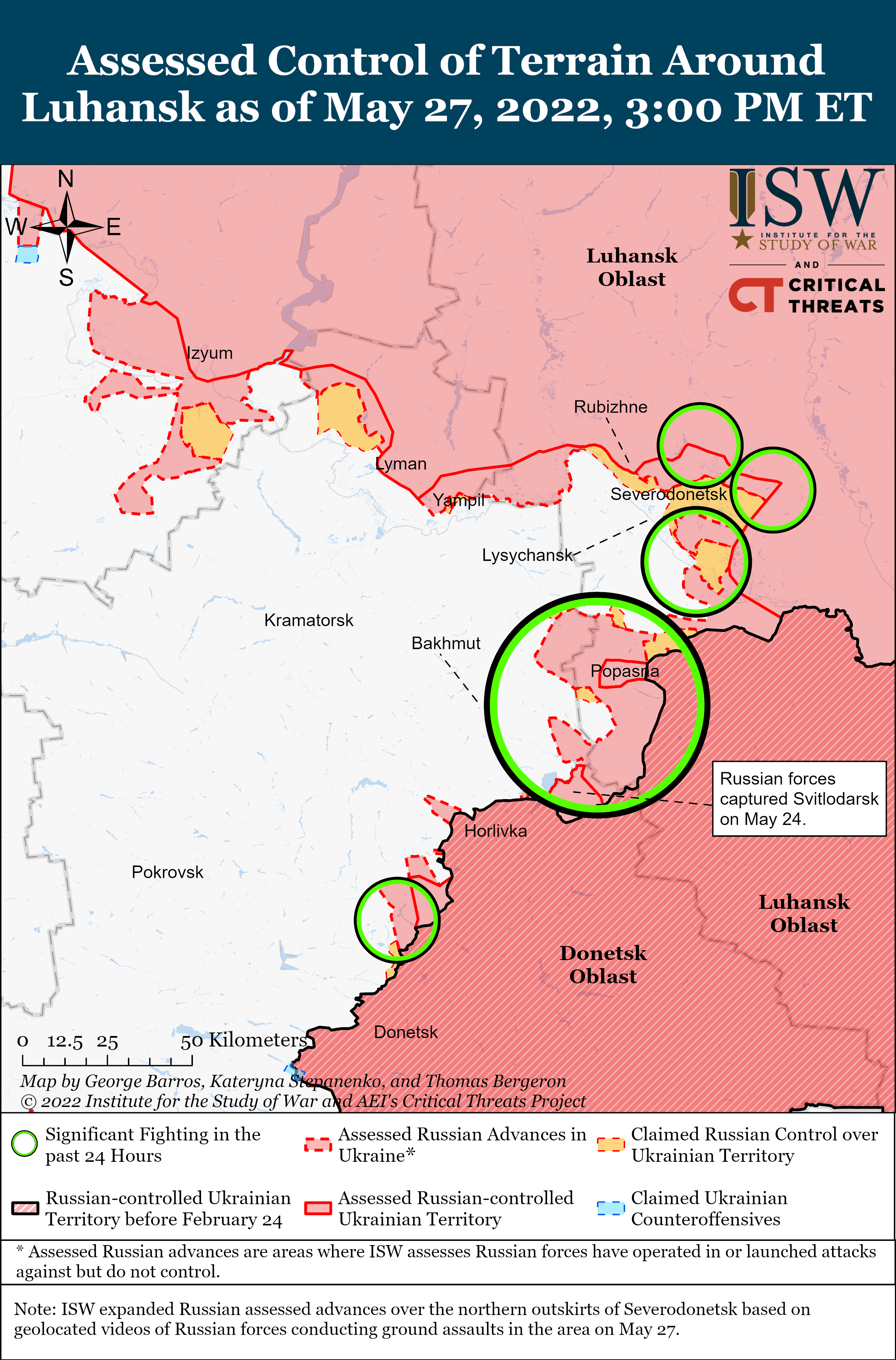*** MILITARY SITUATION ***
Russian forces attempted to seize access to two highways east and northeast of Popasna on May 27 in a continued effort to partially disrupt Ukrainian GLOCs to Severodonetsk. The Ukrainian General Staff reported that Russian forces continued assaults against villages adjacent to the T1302 highway from Bakhmut to Lysychansk, just northeast of Popasna. Russian forces also attacked east of Popasna to secure access to the T1303 highway to Lysychansk. Russian forces are likely prioritizing the Lysychansk direction, rather than advancing toward Bakhmut, to support Russia’s main effort operations in Severodonetsk.
Russia is tightening the noose on Ukrainian troops in the country's east. A fierce ground and artillery assault has seen Moscow's forces advance, and they now appear close to encircling the last two hold-out cities in Luhansk province — which together with neighboring Donetsk forms the Donbas region that has become the key focus of the Kremlin’s war. With Ukrainian officials voicing concern their troops are now outmanned and outgunned, this Russian push could prove a decisive moment in the conflict.
Russian troops have taken over the town of Liman in the northern Donetsk region, the government in Kiev admitted on Thursday evening. Ukrainian forces have reportedly withdrawn west-southwest towards Slavyansk. “We have lost the town of Liman,” Alexey Arestovich, adviser to Ukrainian President Volodymyr Zelensky, said in a livestream on Thursday. Though Arestovich cited “unconfirmed reports,” Russian military correspondent Alexander Kots posted a video of Russian troops in the city shortly thereafter, captioned “Liman is ours.” Ukrainian troops “fled” west and southwest, Kots added, while covering their retreat with artillery fire.
-Russian forces began direct assaults on built-up areas of Severodonetsk without having fully encircled the city and will likely struggle to take ground in the city itself.
-Russian forces in Lyman appear to be dividing their efforts—attacking both southwest to support stalled forces in Izyum and southeast to advance on Siversk; they will likely struggle to accomplish either objective in the coming days.
-Russian forces in Popasna seek to advance north to support the encirclement of Severodonestk rather than advancing west toward Bakhmut.
-Positions northeast of Kharkiv City remain largely static, with no major attacks by either Russian or Ukrainian forces.
-Russian forces continue to fortify their defensive positions along the southern axis and advance efforts to integrate the Kherson region into Russian economic and political structures.
-The besieged city of Sievierodonetsk in eastern Ukraine appears to be almost completely surrounded by attacking Russian forces. Russia has continued to make incremental gains in its offensive in the Donbas region, backed by withering shell fire. The regional governor of Luhansk, Serhiy Haidai, said Russian forces have surrounded two-thirds of Sievierodonetsk.
-Ukrainian authorities have issued differing statements about their control over the strategic city of Lyman in the Donetsk region. A presidential adviser said he had unverified information that Ukraine had lost Lyman, while Ukraine’s armed forces said Russian troops were trying to strengthen their positions in the city. The governor of the Donetsk region, Pavlo Kyrylenko, said there was heavy fighting around the city after Ukrainian troops withdrew to a new line of defence. Russian media reported that pro-Russian separatists had seized the city.
-President Volodymyr Zelenskiy speaking in a short video address said the situation in Donbas is “very difficult”. He said Russian forces are concentrated in the coastal region of Ukraine and using “maximum artillery” reserves. “We are protecting our land in the way that our current defensive resources allow,” he said. “And we are doing everything to strengthen them.”
